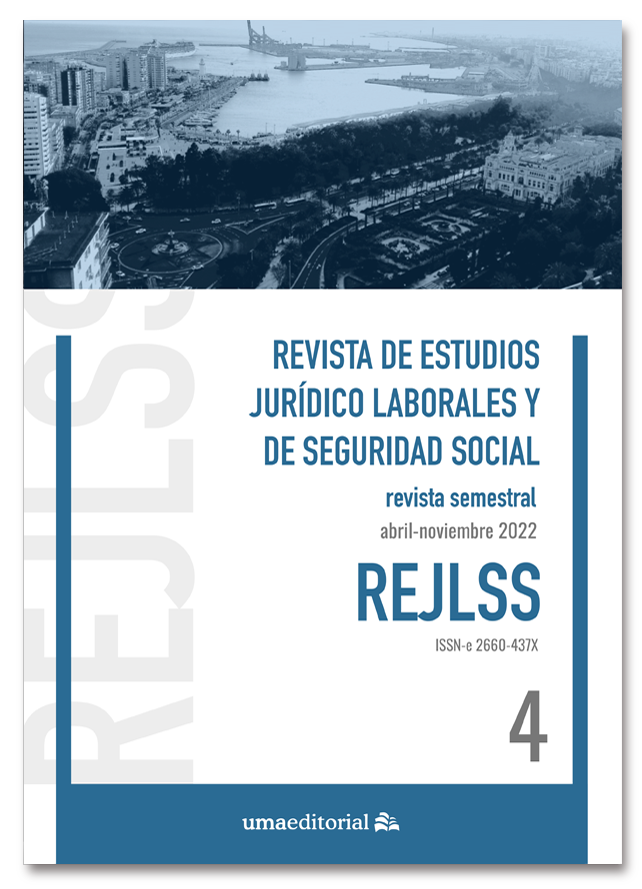On Flexible Criteria for the Appointment of Trade Union Delegate
A Closed Question?
DOI:
https://doi.org/10.24310/rejlss.vi4.13978Keywords:
Trade union delegate, trade union branch, collective bargaining agreement, trade union representation in the company, freedom of associationAbstract
This paper analyses various questions on trade union representation in the company. After contextualising this matter in the doctrine of the Constitutional Court regarding the minimum or additional content of trade union freedom, it reviews the case law of the Supreme Court on the appointment of trade union delegates in the company and analyses its judgements over the last three years, focusing on two main issues: the role of the collective agreement in this matter and the possibility of appointing trade union delegates in intermediate areas between the company and the workplace. Also important is the study of the sectoral regulation of the last twenty-two months. In the conclusions, interpretative guidelines are proposed with regard to the connection between trade union representation and the role that could be played by the collective agreement.
Downloads
Metrics
Publication Facts
Reviewer profiles N/A
Author statements
Indexed in
-
—
- Academic society
- N/A
- Publisher
- Universidad de Málaga. UMA Editorial
References
Álvarez Alonso, D., Representación y participación de los trabajadores en la empresa. Estudio de jurisprudencia y perspectiva de futuro, Tirant lo Blanch, Valencia, 2020.
Álvarez Alonso, D., “El contenido adicional de la libertad sindical: sentencia TC 145/1999”, en AA.VV. (García Murcia, J., Coord.), Libertad Sindical y otros Derechos de acción colectiva de trabajadores y empresarios, Thomson-Reuters-Aranzadi, Cizur Menor (Pamplona), 2014.
Esteban Legarreta, R., El ámbito de las representaciones sindicales, Editorial Bomarzo, Albacete, 2020.
Martín Valverde, A. y García Murcia, J., Derecho del Trabajo, 30ª edición, Tecnos, Madrid, 2021.
Monereo Pérez, J.L. y Fernández Avilés, J.A., “La libertad sindical en la doctrina del Tribunal Constitucional”, Revista del Ministerio de Trabajo y Asuntos Sociales, nº 73, 2008.
Montoya Melgar, A., Derecho del Trabajo, 41ª edición, Tecnos, Madrid, 2020.
Nieto Rojas, P., “El centro de trabajo como ámbito de actuación de los delegados sindicales. Injerencia legal en la autonomía sindical”, Dereito, volumen 24, número 2, accesible en: http://dx.doi.org/10.15304/dereito.24.2.2814.
Palomeque López, M.C., Derecho Sindical, 4ª edición, Ediciones CEF, Madrid, 2018.
Palomo Vélez, R.I., El modelo español de representación de los trabajadores en la empresa, Tirant lo Blanch, Valencia, 2017.
Preciado Domènech, C.H., Secciones sindicales y delegados sindicales, Editorial Bomarzo, Albacete, 2015.
Sala Franco, T., Derecho Sindical, 3ª edición, Tirant lo Blanch, Valencia, 2020.
Suárez González, F., “El contenido adicional de la libertad sindical”, en AA.VV. (Montoya Melgar, A., Coord.), El trabajo y la Constitución. Estudios en homenaje al Profesor Alonso Olea, Ministerio de Trabajo y Asuntos Sociales, Madrid, 2003.
Downloads
Published
How to Cite
Issue
Section
License
In the Revista de Estudios Juridico Laborales y de Seguridad Social (REJLSS) we are clearly committed to a policy of open access to scientific knowledge (See Berlin Declaration).
Those authors who have publications with this journal accept the following terms:
This journal provides immediate free access to its content under the principle of making research freely available to the public. All the contents published in the REJLSS are subject to the Creative Commons license
Attribution-NonCommercial-NoDerivatives 4.0 International (CC BY-NC-ND 4.0)
Copyrights are of two kinds: moral and patrimonial. Moral rights are perpetual, inalienable, non-transferable, inalienable, unattachable and imprescriptible prerogatives. In accordance with Spanish copyright legislation, the authors who publish in REJLSS retain the moral right over their work, as well as the ownership of the patrimonial right, which will be transferred to the University of Malaga for its dissemination in open access.
The patrimonial rights, refer to the benefits that are obtained by the use or disclosure of the works. REJLSS is published in open access and is exclusively authorized to perform or authorize by any means the use, distribution, dissemination, reproduction, adaptation, translation or transformation of the work.
It is the responsibility of the authors to obtain the necessary permissions of the images that are subject to copyright.
Authors whose contributions are accepted for publication in this journal retain the non-exclusive right to use their contributions for academic, research and educational purposes, including self-archiving or depositing in open access repositories of any kind.
The electronic edition of this magazine is edited by the Editorial of the University of Malaga (UmaEditorial), being necessary to cite the origin in any partial or total reproduction.
The authors may adopt other non-exclusive license agreements for the distribution of the version of the published work (eg: deposit it in an institutional telematic archive or publish it in a monographic volume) provided that the initial publication is indicated in this magazine.
Authors are allowed and recommended to disseminate their work through the Internet (eg, in institutional telematic archives or on their website) before and during the submission process, which can produce interesting exchanges and increase citations of the published work.







19.png)
